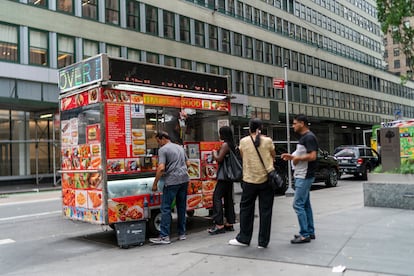The cost of New York street food is soaring
Prices are up 31% since the Covid pandemic as cart operators wrestle with inflation, bureaucracy and a dwindling number of new licenses


Regular U.S. consumers of so-called happy meals – hamburgers and other cheap fast food –have seen a 31% hike in their cost since the Covid pandemic. This is a far bigger increase than the cost of products in the basic shopping basket, which has also risen considerably. Given the combination of inflation and red tape, it is not surprising that a diverse range of street food sold in stands and carts at New York’s subway exits and other key locations, has also risen in price. Now, a halal food stand in the center of Manhattan sells a rice and chicken dish for $10 (€9.30) — 67% more expensive than in 2020, when the pandemic took hold.
Consumers who continue to buy street food as a cheap and convenient option are complaining about the price hike, while the sellers claim they are barely covering costs: chicken is twice as expensive as in 2020; the same can be said of the gas that fuels the cooking and the cardboard container in which the dish is served. Another major difficulty is the scarcity and cost of the permits needed to operate: New York has curbed their supply, even though street food and drink saved many New Yorkers, mostly of immigrant origin, from hardship in the wake of the pandemic.
Many vendors claim they must obtain their permit surreptitiously, by renting one from a permit holder. The average cost of permit rental is $18,000 over two years, but varies according to the vending location. The pandemic is being held responsible for this development too. For years, the annual cap on permits was approximately 5,100, but in 2021 the City Council decided that only 445 new permits would be issued per year for the next decade. So far, only 71 have been granted.
The complicated and restrictive legislation on permits has influenced the price of even the most modest snacks from a range of international vendors, some of whom appear in tourist guides. Thiru Kumar’s dosa stand, a gastronomic pilgrimage spot in the Big Apple, balks at charging more than the $6 he charged in 2020. “I wouldn’t have the lines I have if I raised the price, so I adjust the budget and obviously cover costs, but I’m left with a much smaller profit. In return, I have a steady clientele,” explains Kumar.
Impact of remote work
The rise of remote work is also making the day-to-day viability of food carts difficult. “When I started, people went to the office five days a week and there was a cart on every corner,” explains Mahmud, chef and owner of a falafel food cart on 66th Street in Manhattan. “Now that people are going to the physical workplace less, the food cart business is losing ground while prices keep going up.”
Declining clientele, rising costs and red tape regarding permits are conspiring against a popular ecosystem that is part of New York’s essence and closely tied to its successive waves of immigration. “Compare what a falafel costs to one of those ready-made salads sold by modern health chains – about $20 in a plastic or cardboard bowl, without a drink. We are still a very reasonable alternative for good food at a good price, but the authorities only put obstacles in our way,” Mahmud concludes.
Sign up for our weekly newsletter to get more English-language news coverage from EL PAÍS USA Edition
Tu suscripción se está usando en otro dispositivo
¿Quieres añadir otro usuario a tu suscripción?
Si continúas leyendo en este dispositivo, no se podrá leer en el otro.
FlechaTu suscripción se está usando en otro dispositivo y solo puedes acceder a EL PAÍS desde un dispositivo a la vez.
Si quieres compartir tu cuenta, cambia tu suscripción a la modalidad Premium, así podrás añadir otro usuario. Cada uno accederá con su propia cuenta de email, lo que os permitirá personalizar vuestra experiencia en EL PAÍS.
¿Tienes una suscripción de empresa? Accede aquí para contratar más cuentas.
En el caso de no saber quién está usando tu cuenta, te recomendamos cambiar tu contraseña aquí.
Si decides continuar compartiendo tu cuenta, este mensaje se mostrará en tu dispositivo y en el de la otra persona que está usando tu cuenta de forma indefinida, afectando a tu experiencia de lectura. Puedes consultar aquí los términos y condiciones de la suscripción digital.








































